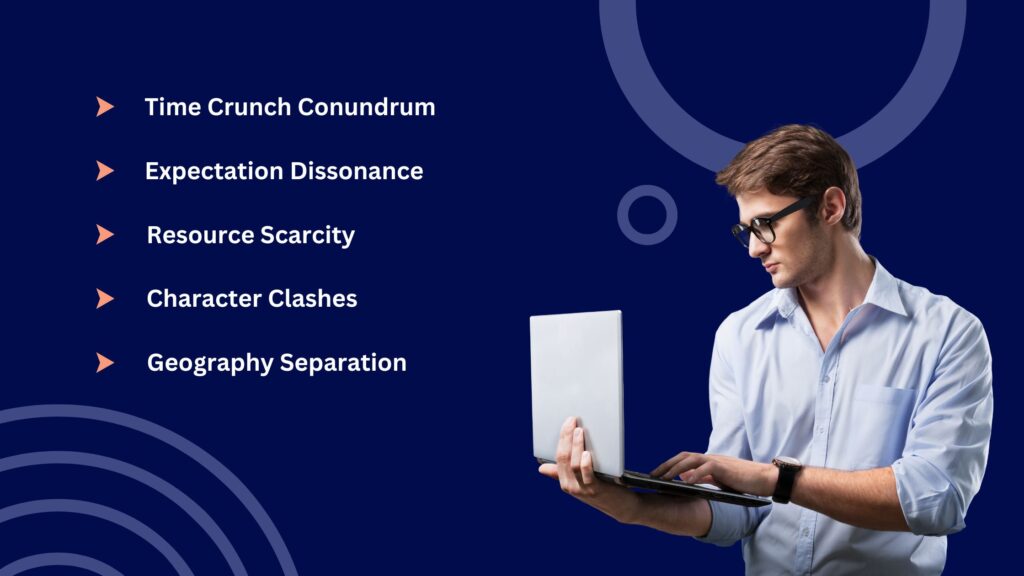
The concept of modern mentoring 2.0 is a revolutionary mentor-mentee pairing. Its approach goes beyond a traditional mentoring setup. It is a refined, improved adaptation of the classic mentor-mentee dynamic, building compatibility, and delivering greater efficacy.
Wondering what was wrong with conventional mentoring? There is nothing much wrong with it but the classic mentor-mentee dynamic can bring about a variety of obstacles.
The core issue with classic mentoring relations is that matching can be taxing, as it gets difficult to build pairs manually. Moreover, these conventional mentoring setups could be onerous to organize physically and can consume an exorbitant amount of time. Apart from that, the manual process makes it prone to human errors.
The conventional paradigm of mentorship encompasses several rounds of individual rendezvous but hasn’t quite adapted to the vibe of the contemporary workforce. In fact, it fails to harness the full potential of the mentoring sessions owing to the lack of resources that are at the virtual mentoring platform’s disposal. We shall cover more about conventional mentoring shortcomings later in this blog.
Conversely, the upgraded version of mentoring, that is, mentoring 2.0 resolves these predicaments and yields a more advantageous, mutually satisfactory connection between mentors and mentees.
With all these in view, this blog will focus on Modern Mentoring 2.0; its features, and how its key components make it an upgraded means – a need of the hour.
Read Also: Start your 2023 with Virtual Mentoring
A Quick Glimpse at Modern Mentoring 2.0

Before we touch base on what Modern Mentoring 2.0 is, let’s enhance our understanding of mentoring. Mentorship serves people with clarity – on both professional and personal fronts. Mentors come with immense expertise and knowledgeable background and are keen to bestow their wisdom to mentees who are eager to mark check on their goals.
Mentoring can be executed through classroom sessions (also called traditional mentoring) and by utilizing virtual mentoring platforms (called modern mentoring 2.0). But as aforementioned, traditional mentoring is plagued with multiple problems, and some are explained hereunder:
Time Crunch Conundrum
Mentors and mentees frequently juggle hectic agendas, making it an uphill challenge to pin down a convenient time for consistent rendezvous.
Simply put, despite their best intentions, mentors may struggle to offer encouraging guidance due to their schedules being swamped with appointments–leaving the mentees feeling adrift and unsupported.
Expectation Dissonance
Occasionally, the mentors and mentees might not vibe on the same wavelength regarding their respective aspirations for the mentoring bond.
Resource Scarcity
Subject to the organization, mentors could lack the modern tools or resources to proficiently steer their mentees in the right direction.
Character Clashes
As with any other connection, personality face-offs can transpire between mentors and mentees, resulting in a less-than-stellar alliance.
Geography Separation
Mentoring is an indispensable element for realizing one’s personal and career objectives, yet typical mentorship programs come across as an issue because of the geographical division between mentors and mentees. This results in mentees having difficulty maintaining a consistent association with their mentors and receiving real-time feedback.
Hence, it’s vital to confront these conundrums straight up in the early phases of the mentorship journey. Modern mentoring 2.0 serves as the ultimate catalyst with features like Anytime Mentoring for conquering several of these obstacles one of which is geographical constraints.
How can Modern Mentoring Address Traditional Mentoring Issues?
Modern mentoring can solve traditional mentoring issues by utilizing virtual mentoring platforms, replete with different kinds of resources. With the help of virtual tools, mentors and mentees can connect and collaborate for better outcomes. This leads to a creation of an efficient knowledge-sharing environment. Plus if the mentoring practice occurs online, mentors and mentees can reach each other anywhere without any geographical obstruction.
The sophisticated virtual platform also enables mentors to give a more comprehensive and personalized experience to their mentees. Additionally, modern mentoring 2.0 brings a more adaptable timeframe, granting mentors and mentees the opportunity to work according to their own convenient schedules.
More Reasons to Switch to Modern Mentoring 2.0

In the contemporary, high-octane professional landscape, modern mentoring 2.0 has blossomed into an essential instrument for nurturing progress among team members for a number of reasons:
Faster Access to Mentors
Millennials, typically known for their constant craving for knowledge and collaborative spirit, can reap immense benefits from connecting with seasoned mentors virtually.
Building Rapport
It has also been noticed that structured mentoring initiatives through virtual platforms not only fulfill the craving for learning but further solidify the rapport between millennials; their mentors, and their desire to stay connected with the organizations too. It also helps fill in leadership spaces, assuring a smooth transition of authority.
Advanced-Data Insights
The advent of HR analytics in virtual platforms has revolutionized how mentoring relationships are forged, paving the way for effective learning and development atmosphere.
Organizations can utilize sophisticated data insights to optimally understand mentors’ and mentees’ mentoring requirements based on diverse criteria like aptitude, work habits, temperaments, and schedules. This data-driven technique ensures both parties gain the utmost benefits from the alliance, resulting in augmented job gratification and output.
Comprehensive Mentoring
Modern Mentoring 2.0 encompasses a myriad of innovative mentoring sessions; namely:
These modern techniques and skill-building measures ascertain that individuals receive well-rounded support, tailored to their specific requirements. Consequently, this fosters an atmosphere of ongoing education and adjustability, vital in the constantly-shifting professional landscape.
Smooth Transfer of Knowledge
The workforce demographics continue to shift towards millennials and Gen Z as they yearn to make a positive difference in the workplace. Hence, both informal and formal processes incorporation become imperative to facilitate the transfer of knowledge across generations.
By harnessing the varied and considerable talents of their staff, businesses can cultivate a collaborative and united atmosphere conducive to productivity and ingenuity.
In essence, modern mentoring 2.0 sets the groundwork for an exhilarating future, where personnel feels enabled to attain their peak capabilities and companies benefit from their collective insight.
Build a Learning Culture
Companies can upskill their current workforce by accessing a plethora of courses present on mentoring platforms when required. This upskilling can not only help the workforce to upgrade their knowledge base but also help firms to increase their productivity.
Also Read: The Right Structure for Your Virtual Mentoring Program
Key Components of Modern Mentoring 2.0
Modern mentoring 2.0 provides an eclectic selection of mentoring and guidance options, from peer-to-peer and group mentoring to more specialized forms like reverse or flash, or anytime mentoring sessions. This assorted array of approaches, as explained one by one, enables businesses to choose the mentoring style that best fits their workforce and polish the employee’s expertise to achieve the company’s predetermined goals.
Peer Mentoring
Peer mentorship epitomizes a dynamic interplay, cultivating an atmosphere where associates share wise counsel, indulge in collaborative learning, and support the professional development of their fellow mates. It s a remarkable way to offer mentorship and advice to one another. By collaborating, two or more peers join forces to exchange their insights, capabilities, and expertise. Discussions of both struggles and accomplishments foster a closer bond between mentees and further their individual and career growth.
Leadership Mentoring
A well-structured mentoring program geared towards leadership growth can be extremely advantageous for both the company and the individuals involved. For instance, a sales manager who primarily focuses on reaching financial targets might overlook other vital aspects such as team management or individual spirit which play an essential role in improving product quality. With the help of mentors having wide-ranging managerial skills, the sales manager could expand their leadership perspective. Overall, leadership mentoring helps in grooming potential employees and building a rewarding succession planning strategy.
Thus, leadership mentoring entails the cultivation of individuals’ leadership aptitudes. Such mentoring programs are frequently utilized to aid novice leaders in acquiring decision-making prowess, team management abilities, as well as goal-setting and attainment proficiencies.
Group Mentoring
Group mentoring is an outstanding way of sharing knowledge, assisting companies to enhance employees’ productivity, and spurring enterprise expansion. It involves connecting people with allied backgrounds, capabilities, or goals to encourage one another with advice.
By this collective method, participants can exchange acumen about each other’s work styles and comprehend the other’s procedures of accomplishment. This type of mentoring helps staff to become proficient sooner and broaden their know-how. Furthermore, it invigorates team spirit, heightens cooperation, and fortifies confidence in the workplace.
Reverse Mentoring
Usually, senior executives with extensive experience provide invaluable guidance to junior staff–but their cohorts who are far younger too have some essential information to share with their superiors. This is the concept behind ‘reverse mentoring’, an approach initially crafted in the ’90s to exchange tech abilities.
Reverse mentoring can be an all-important asset to any organization, providing numerous advantages and leaving a lasting impression. It can aid in the retention of millennials, facilitate the sharing of digital expertise, foster diversity, embolden new hires to express themselves and enhance new joiners’ abilities.
Flash Mentoring
Flash mentoring is a form of mentoring that involves a swift exchange between mentors and mentees. This approach is frequently used when urgent guidance and directions are needed. Flash mentoring offers both the mentors and mentees a chance to gain insights in a quick span of time.
Conclusion
Modern Mentoring 2.0 is a revolutionary approach to mentoring programs that offer a host of features and resources needed for comprehensive mentoring sessions. This approach helps to overcome the problems faced in traditional mentoring systems, such as time crunch conundrum, expectation dissonance, resource scarcity, character clashes, and geography separation.
Besides, modern mentoring 2.0 through virtual mentoring platforms such as Mentoring Complete offers full-package features such as faster access to mentors, rapport build-up, advanced data insight through analytics, smooth transfer of knowledge, and more. Taking into consideration the effectiveness of modern mentoring 2.0, businesses of all sizes can consider utilizing Mentoring Complete and reap its numerous benefits. Want to learn more about it?
Frequently Asked Questions
Q. How has Modern Mentoring 2.0 revolutionized mentoring?
Modern Mentoring 2.0 has transformed mentorship by leveraging technology and innovation to enhance the efficacy of mentoring initiatives.
Q. What is Modern Mentoring 2.0 all about?
It’s a new and improved way of mentoring that uses online tools to make mentor-mentee connections even better! It’s all about helping mentors and mentees achieve their goals through virtual mentoring platform resources.
Q. How does Modern Mentoring 2.0 differ from traditional mentoring programs?
Mentoring 2.0 encompasses varied virtual tools like video calls, chat sessions, and other features to facilitate the connection between mentors and mentees conveniently.
Q. Who stands to gain from the contemporary Mentorship 2.0 approach?
Mentorship 2.0 framework is crafted to advantage both guiding lights (mentors) and their protégés. Mentors relish heightened involvement, superior groundwork, and greater responsibility, and mentees acquire enhanced self-assurance, better efficiency, and more robust networking means.